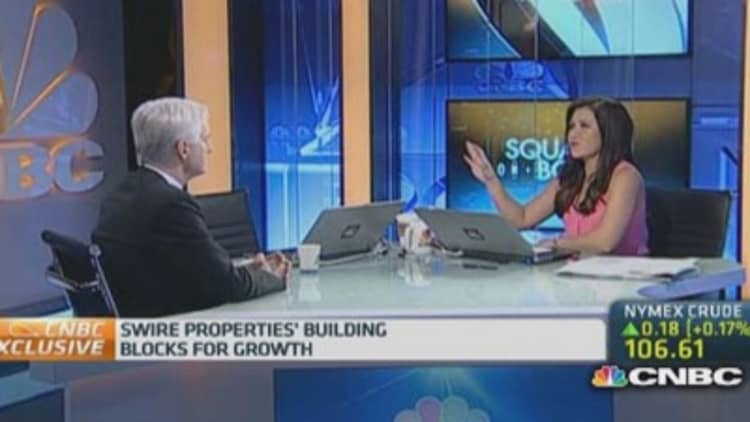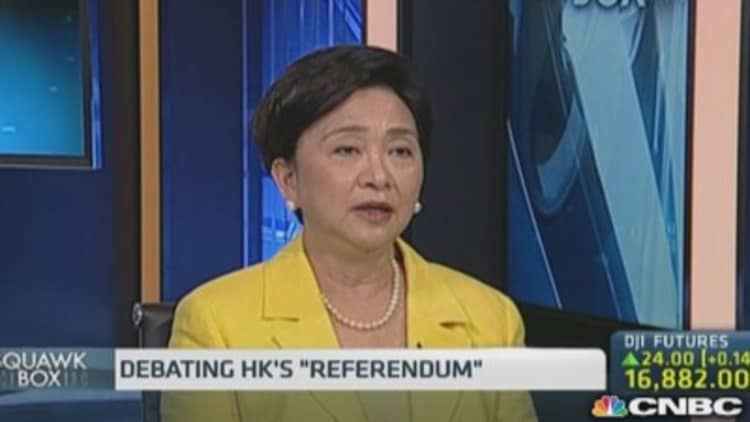
As a pro-democracy movement gains steam in Hong Kong, some worry the campaign could hurt the city's competitiveness and rattle its financial market.
Last week, the "Occupy Central" movement launched an informal referendum on how Hong Kong should pick its chief executive. The turnout surpassed expectations, with over 700,000 citizens voting, online or in person, since June 20.
Read MoreHundredsof thousands vote inHK democracy 'poll'
Although Beijing officials deemed the ballot illegal, organizers hope the high turnout will bolster the case for China to honor its promise to give the Special Administration Region (SAR) universal suffrage in 2017. Organizers also plan a massive sit-in in Hong Kong's financial district if officials don't accede to its demands.
Hong Kong, a former British colony, returned to Chinese rule on July 1, 1997, under the formula of "One Country, Two systems" which promises the city wide-ranging autonomy. But tensions escalated recently after Beijing released a "white paper" in which it reasserted its authority over Hong Kong.
Competitiveness at stake
Hong Kong is among Asia's most competitive economies. It ranks fourth globally in terms of competitiveness, after the United States, Switzerland and Singapore, according to 2014 "IMD World Competitiveness Yearbook".
But potential instability caused by the civil movement could weigh on Hong Kong's ability to remain China's most competitive city, the Center for City and Competitiveness from the Chinese Academy of Social Sciences said. It ranked Hong Kong as China's most competitive city in its "2014 China Urban Competitiveness Report."
To combat potential disruptions, the Hong Kong Monetary Authority conducted an emergency drill with 55 banks last week, the South China Morning Post reported.
Read MoreInvestingin China: A Catch-22?
Companies like Swire have also prepared contingency plans.
"'Occupy Central' concerns us," said Swire Chairman John Slosar. "For a small city like Hong Kong, it's important that we have a good business climate and a rule of law. Anything that threatens to destabilize that is ultimately not in Hong Kong's interest."
The Hong Kong General Chamber of Commerce, together with four other business chambers representing Canada, Italy, Bahrain and India, also sounded warnings that demonstrations may "cripple businesses."
However Emily Lau, Chairwoman of the Democratic Party, says fears have been overblown.
"I have talked to a number of business people, they are quite relaxed. There will be people who have scuffles with the police but the organizers have said it will be peaceful and we are supporting that," Lau told CNBC Asia's "Squawk Box" on Monday.

Are financial markets at risk?
Earlier this week, retired Chinese official Chen Zuo'er cautioned that the pro-democracy movement may give foreign speculators a chance to spread rumors and in turn profit from instable financial markets, according to China Daily.
But Jackson Wong, Vice President of Tanrich Securities, says this is unlikely.
"I believe market participants will try to use the current situation to trade on things but [to say that] foreign speculators may try to use this to take profit is a bit of a stretch theory at this stage," he said.
Read MoreChina's economyis at a 'tipping point'
Moving forward, Wong believes that any financial market shock may be limited.
"The turnout rate was really surprising and some traders did use it as an excuse to sell off the market on Monday [but] the referendum's effect is really limited to financial market and I guess the surprise effect was done on Monday," he said, referring to a 1.7 percent decline in the benchmark Hang Seng Index despite an upbeat reading on HSBC's China flash purchasing managers' index which expanded for the first time in six months.
Hong Kong shares rose 0.3 percent on Tuesday.

